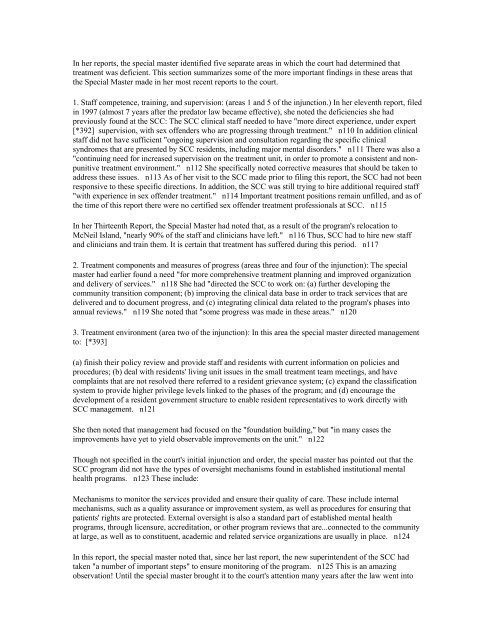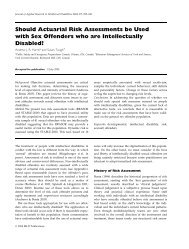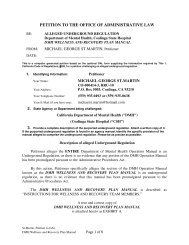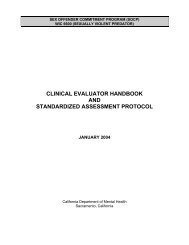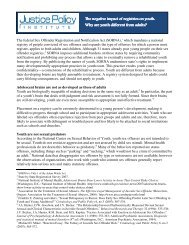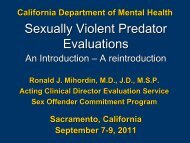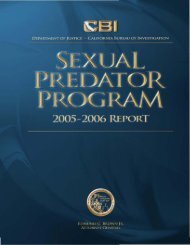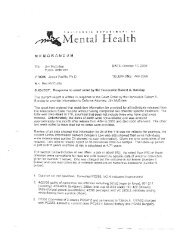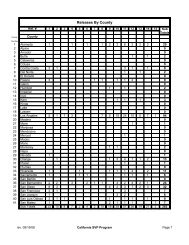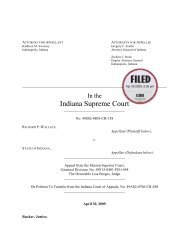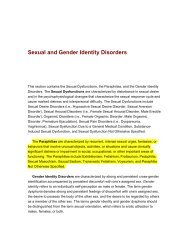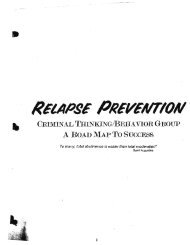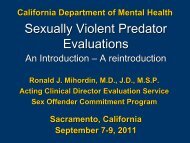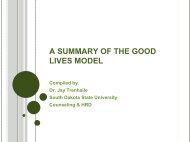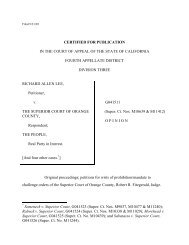Therapeutic Jurisp & Sexual Predator Laws - Defense for SVP
Therapeutic Jurisp & Sexual Predator Laws - Defense for SVP
Therapeutic Jurisp & Sexual Predator Laws - Defense for SVP
You also want an ePaper? Increase the reach of your titles
YUMPU automatically turns print PDFs into web optimized ePapers that Google loves.
In her reports, the special master identified five separate areas in which the court had determined thattreatment was deficient. This section summarizes some of the more important findings in these areas thatthe Special Master made in her most recent reports to the court.1. Staff competence, training, and supervision: (areas 1 and 5 of the injunction.) In her eleventh report, filedin 1997 (almost 7 years after the predator law became effective), she noted the deficiencies she hadpreviously found at the SCC: The SCC clinical staff needed to have "more direct experience, under expert[*392] supervision, with sex offenders who are progressing through treatment." n110 In addition clinicalstaff did not have sufficient "ongoing supervision and consultation regarding the specific clinicalsyndromes that are presented by SCC residents, including major mental disorders." n111 There was also a"continuing need <strong>for</strong> increased supervision on the treatment unit, in order to promote a consistent and nonpunitivetreatment environment." n112 She specifically noted corrective measures that should be taken toaddress these issues. n113 As of her visit to the SCC made prior to filing this report, the SCC had not beenresponsive to these specific directions. In addition, the SCC was still trying to hire additional required staff"with experience in sex offender treatment." n114 Important treatment positions remain unfilled, and as ofthe time of this report there were no certified sex offender treatment professionals at SCC. n115In her Thirteenth Report, the Special Master had noted that, as a result of the program's relocation toMcNeil Island, "nearly 90% of the staff and clinicians have left." n116 Thus, SCC had to hire new staffand clinicians and train them. It is certain that treatment has suffered during this period. n1172. Treatment components and measures of progress (areas three and four of the injunction): The specialmaster had earlier found a need "<strong>for</strong> more comprehensive treatment planning and improved organizationand delivery of services." n118 She had "directed the SCC to work on: (a) further developing thecommunity transition component; (b) improving the clinical data base in order to track services that aredelivered and to document progress, and (c) integrating clinical data related to the program's phases intoannual reviews." n119 She noted that "some progress was made in these areas." n1203. Treatment environment (area two of the injunction): In this area the special master directed managementto: [*393](a) finish their policy review and provide staff and residents with current in<strong>for</strong>mation on policies andprocedures; (b) deal with residents' living unit issues in the small treatment team meetings, and havecomplaints that are not resolved there referred to a resident grievance system; (c) expand the classificationsystem to provide higher privilege levels linked to the phases of the program; and (d) encourage thedevelopment of a resident government structure to enable resident representatives to work directly withSCC management. n121She then noted that management had focused on the "foundation building," but "in many cases theimprovements have yet to yield observable improvements on the unit." n122Though not specified in the court's initial injunction and order, the special master has pointed out that theSCC program did not have the types of oversight mechanisms found in established institutional mentalhealth programs. n123 These include:Mechanisms to monitor the services provided and ensure their quality of care. These include internalmechanisms, such as a quality assurance or improvement system, as well as procedures <strong>for</strong> ensuring thatpatients' rights are protected. External oversight is also a standard part of established mental healthprograms, through licensure, accreditation, or other program reviews that are...connected to the communityat large, as well as to constituent, academic and related service organizations are usually in place. n124In this report, the special master noted that, since her last report, the new superintendent of the SCC hadtaken "a number of important steps" to ensure monitoring of the program. n125 This is an amazingobservation! Until the special master brought it to the court's attention many years after the law went into


